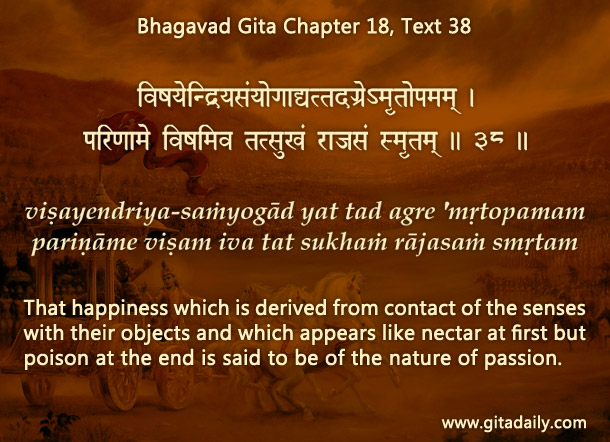Today’s culture often dangles many pleasures that seem free. For example, the Internet offers loads of entertainment, apparently free.
But are such pleasures really free? To understand, consider drug peddlers who give drugs free to college students. The kids may indulge, thinking it free, but may end up hooked. Then those peddlers will charge, and charge exorbitantly.
What applies blatantly to drugs applies to all worldly pleasures, although less blatantly. How? Every indulgence creates within us an impression that impels us to re-indulge. The Bhagavad-gita states that our desires bind us like shackles (16.12). Indeed, even if we never pay monetarily for online entertainment, we may get so attached as to start watching compulsively. Thus it will cost us in terms of emotion, mental energy and time. Cumulatively, we may end up squandering years of our life in indulgences that seem free.
No wonder the Gita cautions that sensual pleasures may taste like nectar initially, but will turn out to be like poison eventually (18.38). Thus, the saying that there are no free lunches applies to free worldly pleasures too. We need intelligence to see that we will have to pay, and pay heavily, for the sensual pleasures that presently seem free.
To understand what poison is likely to follow which nectar, we need to study the Gita in the association of living Gita teachers. Then, we all can become equipped to protect ourselves from the false promises of free pleasures. Additionally and more encouragingly, such Gita study will show us the way to spiritual joys that fulfill and fulfill forever. .
One-sentence summary:
Worldly pleasures that are touted as free aren’t free — intelligence means to know what we will have to pay in future for what appears free now.
Think it over:
- Explain with an example how free pleasures aren’t free.
- Even if we never pay in terms of money for online pleasures, how might we still pay heavily?
- Which worldly pleasure do you think is free? Using Gita wisdom, contemplate how it isn’t actually free.
***
18.38: That happiness which is derived from contact of the senses with their objects and which appears like nectar at first but poison at the end is said to be of the nature of passion.
To know more about this verse, please click on the image
Explanation of article:
Podcast:




Leave A Comment